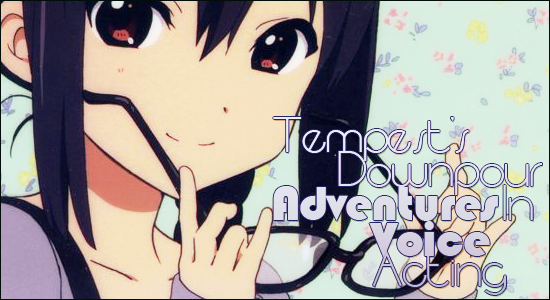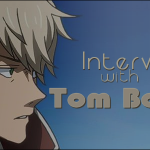Tempest’s Downpour – Anime USA: Adventures in Voice Acting by Tony Oliver

Finishing off Anime USA con coverage is the Adventures in Voice Acting panel I attended Saturday. Tony Oliver hosted the panel and gave us some tips offered at the full-day workshops held at Bang Zoom! Entertainment.
He started his preamble by explaining that voice acting is very difficult to get into and that if you have any lingering doubts, this isn’t the career to pursue. After working in the industry for over 25 years (with credentials including Robotech and writing for Power Rangers), Oliver said the best money is in video game acting and that Bang Zoom! is one of the top voice acting companies in Los Angeles.
The two major locations for voice acting are Los Angeles or Dallas. Oliver said that a small amount of voice work is done in New York, and that Vancouver is an excellent voice acting location outside of the United States.
“You can’t make a living in anime, so you need to be versatile,” he said. “Most voice actors get money from doing commercials.”
Oliver said that the first step is to learn about acting. Doing funny voices isn’t acting. Acting is realistically conveying emotions, not words and Oliver said the best way to do that is to go up on stage. In voice acting, you have to use your body and express yourself – “be larger than life.” On stage, you have to be even larger than that.
The actor’s job is to connect with the audience through a character. When looking at a script, the first thing to do is ask yourself how the character feels.
“Don’t act: feel,” Oliver said.
The next step is to get accustomed to performing in front of audiences. Even in voice acting, you are performing for the director, the producer and the engineer. Oliver suggested taking acting classes, theater workshops, etc. through different teachers who all teach different methods.
Take improvisation to learn to think about character and to improve your reactions. Improvising teaches you to respond quickly and to think on your feet for more emotional scenes.
Oliver said the first gigs you’re going to get are “bits and wala.” That’s background voices and conversations and that’s where you need to shine.
“Take this seriously,” Oliver said. “If they figure out you’re not a trained actor, they’ll stop calling you.”
- Breakdown for Acting:
- Voice acting is acting, not funny voices
- Acting is expressing emotion
- To express emotion, you must feel
- Get training from different teachers
- Act on stage until you are comfortable acting in front of others
- Improvisation lessons are a huge help
Then, he went into the technical aspect of the voice. He described the anatomy involved as being like a bagpipe – when squeezed, it blows air through reeds and gets amplified. The sinuses are the amplifiers while the mouth gives the sound form and structure.
Breathing is the basis of sound, and when a person learns to breathe right, they learn to utilize the voice more effectively. Breathing properly means that the shoulders should not move: all breath is taken into the diaphragm.
Olive suggested lying down with the knees bent. Your body will naturally breathe through the diaphragm this way. Take a book and put it on your torso above the bellybutton – it’s a workout for the diaphragm. Oliver also suggested yoga as another workout which teaches control of the body.
Breathing through the diaphragm allows the body to project sound farther and more clearly. Microphones can’t do all the work amplifying, Oliver said. The end goal is to project without even trying.
“You want to project to fill a room,” he said.
There’s an incorrect belief that speaking comes from the throat. Oliver said speaking and breathing properly push the voice into the head. By placing the voice outside of the throat, voice actors can do 4-hour screaming sessions in the booths.
Also by moving the location of the voice, voice actors can change the age of their voices. Oliver starts off with his voice in front of his teeth when he speaks normally. If he moves it into his head, he sounds like a teenager. If he drops his voice into his chest, he sounds like an older man. Changing the placement of the voice in your mouth also affects accent: Americans speak in the middle of their mouths, British/Bronx are on the tips of their mouths and Australians/southerners are in the backs of their mouths.
Oliver described such a process as “the easiest thing you can do,” but it also “takes a while to master.”
While the microphone doesn’t do all the work amplifying, it does make any little speech-pattern sound that much louder. Voice-actors-to-be need to learn to enunciate properly and to speak very clearly.
Oliver suggested grabbing something you haven’t read before – a book, a magazine, but not a newspaper – and spend between 10 and 20 minutes reading it out loud slowly. By slowly, Oliver means that you should pronounce each and every letter in the word, all while speaking with a rounded mouth.
“You’re going to trip and stumble like crazy and your family will think you’re out of your mind,” Oliver admitted.
However, he suggested this was excellent practice for people who need to make presentations with any regularity. He also said it was a great way to learn new dialects.
- Breakdown of the Voice:
- Learn to breathe through the diaphragm
- Learn to project to fill a room without even trying
- Learn to control the slurs and sounds of your voice
- Learn proper diction to erase any imperfections in your speech-patterns
- Places Tony Oliver suggests getting lessons from:
- Voice and singing coaches
- vocal production for theater
- speech classes
- local choirs
- voice acting workshops
Oliver warned that some voice acting workshops are fake so always research them first.
He outlined the steps needed to break into the business. He said to quiet that self-editing voice in your head that makes you hesitate. There will always be nagging doubts, but you need to learn how to exist with those voices.
Voice actors need to be completely comfortable talking in front of people. At the same time, actors are always out looking for work and auditioning.
“Learn to be fearless,” he said. “You need to be bold enough to.”
The next step is to get a demo made. Also, relocating to Dallas or another voice acting location is key. Some people get hired straight out of voice acting workshops, but Oliver said it takes years to develop an ongoing career.
He said getting a degree is also important. A 2-year degree is good, a 4-year degree is better, but a master’s degree is unnecessary.
Experience is very important. Oliver said to look into opportunities in your local area for ad agencies, radio advertisements, etc. There are online voice acting communities like the Voice Acting Alliance that can help with networking.
- Breakdown for Breaking into the Business:
- Push aside any fears and hesitation and quiet that self-editing voice in your head
- Be fearless: your life will be full of auditions
- Be comfortable talking in front of others
- Get a demo made
- Move to a voice acting location
- Get a degree
- Be patient: it takes years to develop an ongoing career
- Get experience locally
- Network
- Some areas to get experience:
- Volunteer reading
- Reading to the blind
- Books on tape
- Advertisements/radio
The auditioning process is handled differently by everyone. There are many guides on “how to survive an audition.” Oliver said that this is wrong because you should never dread an audition.
“What is it you’re afraid of [in auditions]? That someone is going to judge you?” he said. He pointed out that we all judge ourselves far worse than anyone else can.
The worst thing that will happen is that you won’t get the part. “You probably won’t get it anyway,” he added.
Oliver said auditions should be fun: they should be seen as play time. He described it as an opportunity to get in front of a microphone and play for 15 minutes. Sure, there’s the chance of getting a job out of it, but he said this is your time to go in and enjoy. After all, it costs a stuido $150 to let you use their expensive microphones, but you aren’t being charged a penny.
“As scared as you are, the guy who is casting you is also scared,” he said. “The guy who casts you, his job depends on a good cast.”
Make sure to warm up, stretch out and show up early with a level head. You need to be as prepared as possible for this audition, so research the show ahead of time and have a positive/professional attitude.
“Thank them and make sure they see how happy you are to be there,” Oliver said.
During your audition, the director may have you read in a way you weren’t prepared for. Oliver said to be flexible: that the director is probably testing your abilities and you need to be ready for it.
Oliver said not to hold back and to “lay it all out on the table.”
He suggested asking the director questions, shaking their hand and then leaving after the audition. He warned not to stick around after the audition, as it’s considered rude.
- Breakdown of the Audition:
- Auditions are not survival tests: they are FUN
- Have a positive attitude and do your research on the program ahead of time
- Be pleasant and happy, and shake the director’s hand
- Don’t be afraid to ask questions
- Don’t hold back
- After you finish auditioning, make sure to leave
For more Adventures in Voice Acting visit: http://www.adventuresinvoiceacting.com/
To sign up for workshops visit: http://www.adventuresinvoiceacting.com/workshops
For the Voice Acting Alliance go to:http://voiceactingalliance.com/board/forum.php















For Fanatics out there we have three different Adventures In Voice Acting panels by Tony Oliver 😀